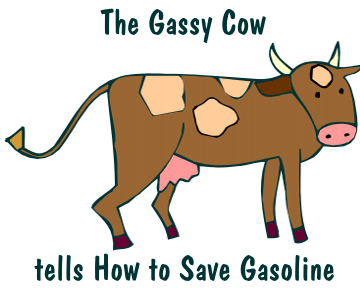

1. Chose a fuel efficient car to begin with.
Bigger is no longer better when the price of gas is skyrocketing. You may
have noticed that even auto-manufacturers are touting their fuel efficiency in
their ads. I saw an ad recently that said that 9 out of 10 GM cars have an
MPG of 30 or better. I don't know if this is true, maybe they have fine
print on the ad to explain, but that isn't important. The higher the MPG
the better. Hybrid cars are more efficient than non-hybrids. Diesel
is more efficient than gasoline. There aren't any hybrid/diesel cars yet,
but when developed they should be the most efficient cars on the road.
Let's just hope it doesn't take too long.
2. Public transportation
Look into public transportation. What better time than when gas prices are high,
to re-investigate whether there's a train or bus that is on your route to work
and can save you money.
3. Carpooling
Is carpooling the new way to meet your life partner? No, but it can save you
enough to go on several dates.
|
4. Use correct grade fuel
5. Brand difference Crude oil is crude oil. The oil companies all use the same refineries, pipes and trucks to get the oil to your local station. Even if one brand in the future created something to make its gas more efficient, the other companies would follow suit. Just look for the cheapest gas you see, its pretty much the same as the most expensive gas you see anyway. 6. Check for leaks This could be a safety issue too. You could be leaking oil, antifreeze, brake fluid, etc. Catching these leaks early could avoid both an accident or a costly repair. "Gasoline evaporates you might not see a big pool of it but if you see some discoloration in the concrete you might have some, and yes if you're leaking gas you're leaking pennies and maybe dollars and that something to be fixed," Csaba Csere, Editor-in-Chief for Car and Driver Magazine
7. Inflate tires properly |
8. Check your oil
A well lubricated car runs more efficiently.
9. Change air filter
Change your own air filter. For fuel to burn it needs air. The cleaner the
better. The air filter actually filters the air of pollutants. But
as these pollutants build up on your filter they limit the air needed to burn
the fuel thus making the process less efficient.
10. Seasonal tires
Seasons change and so should your tires. Snow tires in the spring don't make a
whole lot of sense.
11. Energy-saving oil
Look for oil labeled energy saving.
| 12. Use car wisely Some small errands can be done by walking, this not only saves gas, but helps your heart.
13. Use shortest route |
|
14. Use GPS
Think of all the gas you lose and time wasted when you are lost.
15. Multi-task errands
Plan ahead, make one trip instead of three.
16. Avoid rush hour traffic
Avoid rush hour & other peak traffic periods. No one likes to sit in
traffic anyway.
17. Change work schedule.
If at all possible, change your work start time to avoid gridlock. Stop and go
traffic hurts your gas mileage. It'll probably also help your blood
pressure. No one likes to be stuck in gridlock.
 |
|
20. Shop before you drive
Use the Internet, newspapers or phonebook to comparison shop before you drive to
several stores. Then phone ahead to see if they have what you want in
stock.
21. Grocery shop once a week
Small trips to pick up a few things add up to a big waste in gas. Stock up
on essentials, so you don't have to make these small trips. If you
have the essentials you can make due with what you have in the house until your
next weekly grocery trip..
22. Avoid idling
Avoiding excessive idling can save up to 19 percent. If you are going to
idle for more than a minute shut down your car. This is why the hybrid
car's MPG is almost the same for city and highway driving. When the
car is stopped, no gas is being used.
Modern starters with fuel injection and electronic ignitions minimize the amount of fuel needed to start you car. It's better to turn off your engine and start again than to sit with the car idling for over a minute.
23. Avoid warm-ups
Avoid long warm-ups. Modern cars have been designed to minimize the time needed
to warm up one's car
24. Don't rev engine
Time to stop acting like a kid. It wastes gas.
25. Go the speed limit
When you drive, go the speed limit. It's calculated for maximum safety, but will
reward you with maximum mileage. Count on getting more than 20 percent more
mileage traveling at 55 than you would at 70 mph.
26. Keep brakes adjusted
If your brakes aren't adjusted, not only are you wasting fuel but you are also
minimizing time between brake replacement.
27. Drive evenly/use cruise control.
Drive evenly with a steady foot. Don't jiggle the accelerator. Quick starts -
are a quick way to the poorhouse. They burn plenty of gas. According to
Edmunds.com using a cruise control saves up to 14-percent of ones fuel
consumption, average savings of 7 percent
28. Avoid hard stops
The traffic light or stop sign isn't going to move. Getting to them
faster, just to stop and wait isn't going to make your trip any faster and
wastes lots of gas.
|
29. Use right foot only
30. Junk out of trunk
|
 |
31. Let kids walk
Let the kids walk or take their bike. They are often close enough to school and
friends. The kids probably spend too much time playing computer games
anyway, the walk could do them some good. If you don't think the walk is
safe, then walk with them.
32. Walk or bike
If its good for the kids, it'll be good for you too.
33. Find delivery services
Consider dry cleaning delivery services, food and anything else that will bring
what you need, without burning up your gas. If you need the paper
everyday, the paperboy/girl still delivers its also cheaper than at the
newsstand too.
|
34. Park and walk Don't drive around shopping for gas. It's counterproductive. Saving 5 cents a gallon when gas is $3 is only a 1.6% saving. If you have to drive a mile to find it you've wasted the first 15 cents of savings anyway, which would be your saving on $9 worth of gas.
35. Gasbuddy.com |
36. Don't weave, avoid aggressive driving
The more you weave the more gas your burn according to Edmunds.com you could
have u up to a 37 percent savings, average savings of 31 percent.
37. Don't accelerate up hill
38. Fill up when cool
Gas is less volatile when coller and won't evaporate quite so quickly and form
ozone damage in the environment. So we recommend early morning or late evening.
39. Get a light colored car
Light colored cars reflect the sun's rays, keeping the interior of your car
cooler. This will allow you to save air conditioning.
40. Park in the shade
Fuel expands in the heat causing vapors which can and do leak out of your
car. Also when you get back into your car, it won't be as hot.
41. Don't top off gas
Don't top off your gas - it frequently winds up spilled on the road.
42. Tighten gas cap
This keeps the gas fumes in, eventually your car will cool and the fumes will
return to liquid gas.
44. Buy octane additive
Store and buy a bottle of octane. A little of this every few tank fulls will
keep your car and your pocketbook smiling.
 |
|
47. Avoid roof hauls
If you must, then check out some of the aerodynamic carriers to minimize drag..
48. Turn off electronics
Starting your car with electronic devices, like the radio and air conditioning,
turned off, will put less strain on your engine which translates to better gas
mileage. So remember to turn off your radio, AC, car phone charger etc.
before you get out of your car.
49. Shift to high gear
Shift into high gear as soon as possible. Get there by lifting a your foot from
the accelerator a tiny bit early.
50. Find discount gas days
Is only statistically true over a large number of days. It won't be true every
week. Check nearby service stations to see if they offer discounts any
particular days. Some stations offer 10 cents off on Tuesdays for
high-octane gas. If the price is still over the price of your lower
regular octane gas then don't buy it. See above about high-octane fuels.
51. Fill up several days before holiday (Don't fill up at the last minute)
Also, getting a fill-up three days before a holiday will help you save on the
price bump. Gasoline like everything else is dependant on supply and
demand. Buy when the demand is lower.
52. Wait until near empty
Don't fill until near empty. If you do this, it can extend your gas because you
are hauling a lighter load as the tank nears empty. On cold days, however, you
may not want to do this. Running a car with less fuel can be harder on the fuel
pump life.
53. Find credit card discounts
54. Member benefits
Some gas stations offer membership benefits. There are also department and
grocery stores that give discounts at the fuel pump when you use their store
membership cards.
55. Do bodywork as soon as possible.
You've been in an accident. Your car is now damaged but drivable. Is
it worth fixing your car to get it back to its former glory or not. Well
that is your decision. But cars these days have been designed with
aerodynamics in mind. They are all tested in wind tunnels to minimize wind
resistance and the damage to your car has made it more wind resistant than
before. If you are going to fix your car anyway, might as well do it
earlier than later. Not like the price of bodywork is going to decline in
the future anyway.
56. Gate up on pickup trucks.
In testing, it has been determines that if you have a pickup truck, you get
better gas mileage with the gate up than down.
57. Turn off engine while waiting
on-line for fast food.
If there is 3 people waiting in front of you, you're car would be
idling for a long time. Having you engine on and inching up one at a time
isn't going to get your food any faster and you don't have to move up
immediately with everyone else. Turn off your engine and wait in place
while 2 or 3 people order in front of you. If there are 5 or 6 cars in
front of you, parking and walking inside will save gas and you might not wait as
long too :-)